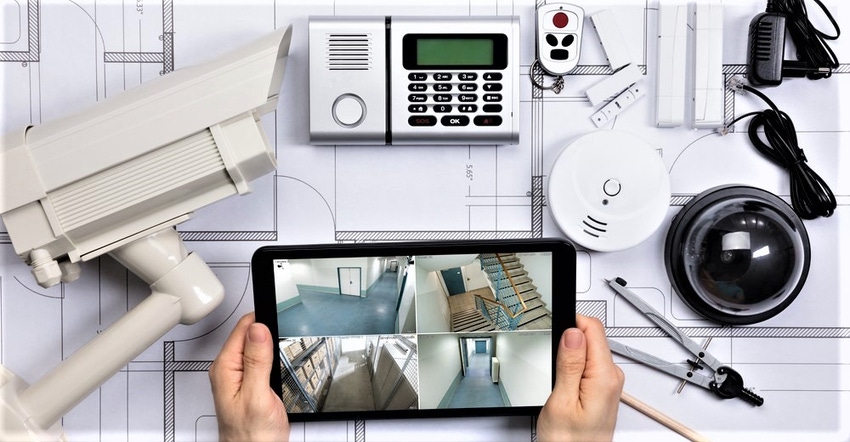The historically established methods of securing a self-storage facility are tried and true, but there are new products and players on the market to help you safeguard your site and streamline operation.

The essence of self-storage security is to present a facility that appears protected. We want to encourage drive-by customers to rent with us by providing a safe environment. We also want to discourage wrongdoers from renting or attempting to break into the property.
The historically established methods of securing your investment are tried and true. However, there are new players on the scene, with new ideas and products that can help safeguard and streamline your operation. Let’s examine some of these.
Access Control
Most modern software is cloud-based, even in the security field. Web-based self-storage access systems allow you to manage multiple sites, manipulate core settings, view and analyze entry and exit activity, and send commands to any site device. The primary benefit of cloud technology is this ability to access, view or change your property data from any mobile device. The manager or owner application, immediately accessible from anywhere, allows you to address needs quickly. These can vary, but they might include:
My customer needs to get through the gate, or needs access to a specific area within the site.
I need to issue or update an access code.
There’s a security situation that needs to be handled quickly.
There’s a safety concern that requires action.
I need to change my property hours to keep up with the competition.
One of my keypads may be failing.
That said, a cloud-based access system needs a safeguard in the event the Internet connection goes down. In the past, if communication failed, the system would let anyone in—or no one. With more modern technology, some systems have keypads or card readers with onboard memory, allowing them to determine if access and egress are authorized based on their most recently accessed information.
Some manufacturers house facility data locally as well as in the cloud. When synchronized, these databases work in concert for a comprehensive safety blanket. Having a system that uses this replication as well as devices with onboard memory provides an added level of assurance that security will be in place 100 percent of the time.
Controlling access at unmanned satellite locations has also become much more reliable thanks to cloud technology. Rental and gate-activity information can be exchanged in real time. It’s not even necessary to have a personal computer at the site; you just need a static IP (Internet protocol) address. Again, it’s recommended to have keypads with onboard memory to ensure system function if there’s an Internet disruption.
Mobile Apps
The logical progression from cloud-based access control was the ability to access a self-storage facility using a smartphone app. Some security providers charge a small fee for their app, while others include it with the overall access system. With a mobile application, tenants can enter the property, disarm their unit, call an elevator and open a door. Other possible app features include the ability to:
Receive notification of unit access and alarm activity
View unit access and event history
Make an online payment
Get site-proximity notifications
Look up an access code
Customers with multiple units can use one account for all activity. And, of course, these applications provide password protection.
Some apps use geo-tracking to authorize access when the user is within range of the site, which will prohibit him from opening the gate from a long distance, whether accidentally or deliberately. This protection is recommended and the most secure.
Electronic Door Locks
Electronic door locks have recently been introduced to the self-storage industry. With these, a renter can use his access code or a clicker to automatically unlock his unit. The facility manager can overlock units or secure vacant units, right from the office.
The lock itself is a floor-mounted device placed in the front corner of each unit. It has a manual release to prevent tenant entrapment. Because it’s on the interior of the unit, it’s more difficult to break in. It also means any necessary troubleshooting or repair could require permission from the tenant, who may want to be present when the unit is opened.
If the unit has a door alarm, the system will provide immediate notification and annunciation if an unauthorized opening occurs. The electronic lock will monitor the status and keep the door locked. Battery backup is available in the event of a power outage.
While the ability to control locks remotely offers convenience, bear in mind the equipment and installation will drive up the cost of your security system.
Experience vs. Innovation
When considering a security vendor, ask yourself: How long has this company worked in the self-storage industry? Is it committed to the storage business for the long term? Does it have the expertise to last for the long haul? Being a beta test or a guinea pig for a new provider can be a risky proposition.
On the flip side, new products and players using innovative technology encourage progress and force existing companies to keep pace. If your supplier hasn’t stayed on the cutting edge, perhaps it’s time to re-examine your security philosophy.
John Fogg is the general manager for Sentinel Systems Corp., a self-storage software and security manufacturing company. He’s been with the firm for more than 25 years and in the self-storage industry since 1986. To reach him, call 800.456.9955; e-mail [email protected]; visit www.sentinelsystems.com.
About the Author(s)
You May Also Like





